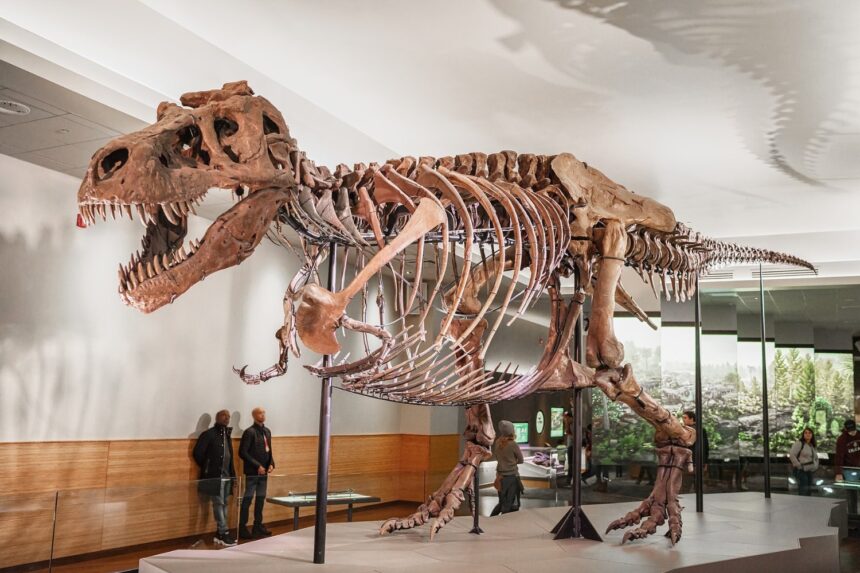Tyrannosaurus rex may be the most famous dinosaur to ever roam the Earth, but these days, it’s at the center of a very modern problem: the luxury fossil trade.
According to a study published in Palaeontologia Electronica, commercial fossil collecting has walled off so many T. rex fossils to scientists that it has severely hindered the scientific record.
The study reveals a sobering stat: of the 141 scientifically useful T. rex fossils known to exist, over half—71 specimens—are in private or commercial hands, rather than public museums or accredited research institutions. That’s a major problem, because in science, replicability is everything. Even if researchers once studied a fossil, its scientific value drops if future teams can’t access it. If a fossil is locked in a collector’s mansion or a storage unit, other scientists can’t study it. They can’t confirm findings, test new hypotheses, or build on the research.
And this isn’t a fringe issue. Since the blockbuster auction of “Sue” the T. rex in 1997 for $8.36 million, T. rex fossils have become the Picassos of the paleontology world—high-status art pieces fetching many millions of dollars at auction. In 2020, Christie’s auctioned off Stan, one of the most complete T. rex skeletons ever found, for a record-shattering $31.8 million, to a museum in Abu Dhabi. That kind of price tag puts a T. rex fossil far out of reach for most museums, unless a philanthropic donor steps in (which, let’s be real, isn’t the norm).
Last year, Stan lost its title as the most expensive fossil when billionaire Ken Griffin purchased the Stegosaurus fossil dubbed “Apex” for $44.6 million; Griffin loaned Apex to the American Museum of Natural History in New York, where it is currently on display. But of the five T. rex fossils sold at auction, only one lot (that of Sue) was purchased by a museum.
Commercial fossil collectors argue that they’re rescuing specimens from erosion and uncovering more fossils than public institutions. And technically, they’re right: Paleontologist Thomas D. Carr, who authored the study, found that commercial outfits have discovered nearly 2.4 times more T. rex specimens than public institutions since the early 1990s. But here’s the catch—only 11% of those commercially discovered fossils are in a public trust where science can actually benefit from them. The rest are put up in living rooms, in storage units to accrue value, or otherwise made to serve other interests than science.
Even worse, many fossils being bought privately or commercially are the most scientifically valuable: juveniles and subadults, which make up the least understood phase of T. rex development. Twenty percent of privately held fossils fall into this category, according to Carr. Without access to these specimens, scientists can’t build a reliable picture of how T. rex grew, matured, or even whether the species showed sexual dimorphism (differences between males and females). According to previous teams, a sample size of 70 to 100 specimens of adult nonavian dinosaurs are required to measure the likelihood of sexual dimorphism in a population with a high degree of certainty.
Carr’s study also takes issue with the trend of publishing peer-reviewed studies based on privately owned fossils—essentially giving scientific legitimacy to inaccessible data. And while defenders of the market argue that fossils often end up in museums eventually, Carr’s data suggests otherwise: only a tiny fraction of privately held T. rex fossils are ever donated or sold to public institutions.
“So far, none of the privately owned T. rex fossils have been donated to, or offered for purchase to a public trust, by a private estate,” Carr wrote. “However, not enough time has elapsed to assess if transfer of T. rex fossils from a private collection to a public trust will be a trend or ever happen.”
T. rex is long extinct, but scientifically speaking, its fossils are becoming an endangered species. Unless scientific understanding of the terrible reptiles becomes a greater priority than the value of the dollar, we may see the science of T. rex go the way of the dodo. Birds of a feather disappear together, I suppose.
Read the full article here












